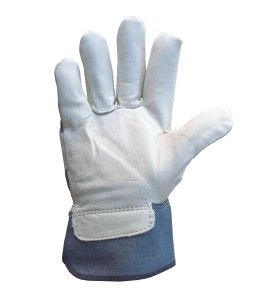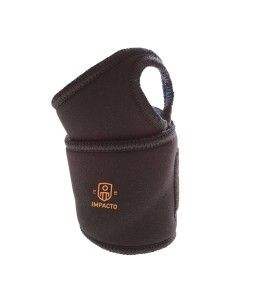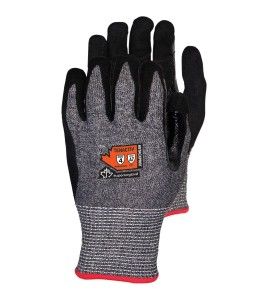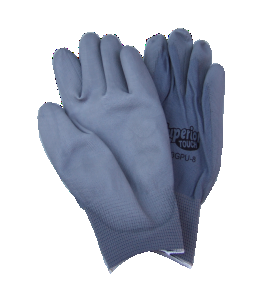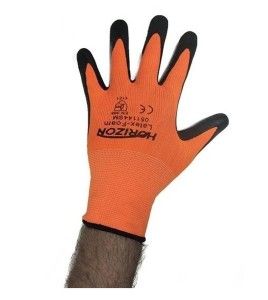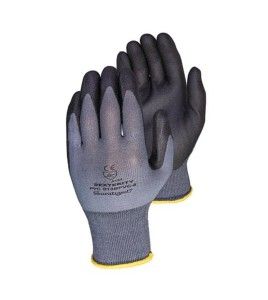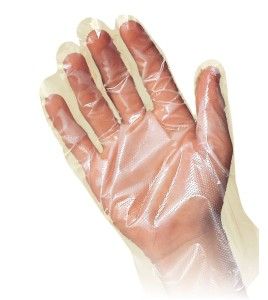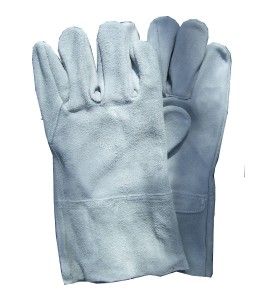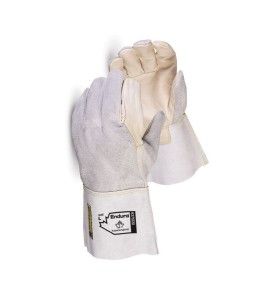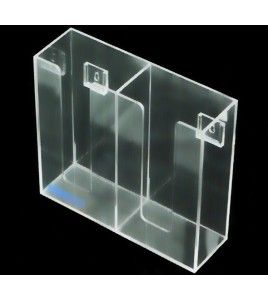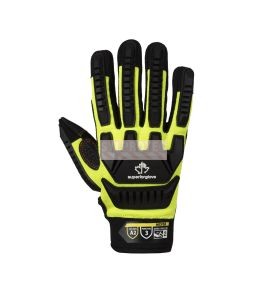Gloves
At Sylprotec, we offer a wide range of gloves designed for various types of work and hand sizes.
Some of the most requested models include:
· Anti-vibration and impact-resistant gloves
· Heat and cold-resistant gloves
· Leather, cotton, and synthetic fabric gloves
· Disposable gloves (latex, nitrile, vinyl)
· Cut-resistant gloves
· Reusable gloves (nitrile, latex, neoprene, PVC, rubber)
Our complete selection ensures that every work environment is adequately protected.
⚠ Always choose gloves suited to the specific risks of your activity to prevent injuries and accidents.
Need help? Contact our customer service team to find the perfect solution.
Subcategories
-
Disposable Latex,...
Sylprotec offers a wide range of disposable gloves suitable for healthcare, food processing, industry, and service sectors. To make the right choice, several factors should be considered.
Thematerial is crucial: vinyl is affordable but less resistant, latex provides good elasticity but can trigger allergies, while nitrile is highly resistant to chemicals and allergy-free.
The color of the glove also plays a role. Blue gloves are preferred in the food industry to prevent contamination, while natural-colored gloves are the most common. Black gloves, usually made of nitrile, are popular in certain professions.
Should you opt for a powdered or non-powdered glove? Powdered gloves are easier to put on and remove, while non-powdered gloves help avoid contamination.
The thickness varies depending on the intended use: 3-mil gloves are suitable for quick tasks, 4 to 5-mil gloves work well in medical and pharmaceutical fields, while 8-mil nitrile gloves offer maximum protection against tears and solvents, making them ideal for mechanics.
Finally, glove size is essential. Sylprotec offers sizes ranging from S to XL in stock, with other sizes available upon request.
Discover our selection:
Among our models, we provide vinyl gloves (powdered or non-powdered), latex gloves (natural or blue), and nitrile gloves (standard or black). We also offer convenient glove dispensers.💡 Order your disposable gloves from Sylprotec today!
📞Need help? Contact our customer service team to find the perfect solution.
-
Cotton or Synthetic...
Sylprotec offers a range of cotton and synthetic fiber gloves, perfect for general tasks like handling boxes, renovations, and inspections. Lightweight, practical, and affordable, these gloves provide both comfort and breathability.
Cotton gloves are ideal for absorbing sweat and reducing discomfort for individuals with skin conditions when worn under waterproof gloves.
Available glove types:- Cotton: Lightweight and breathable.
- Terry-knit cotton with nitrile lining: Oil-resistant for enhanced protection.
These gloves are suitable for professionals and individuals looking for versatile and comfortable hand protection.
💡 Order your gloves from Sylprotec today!
📞Need help? Contact our customer service team to find the perfect solution. -
Leather Gloves
Sylprotec offers a range of leather gloves designed to protect workers' hands from friction and wear. Ideal for tasks that require durability without significant risk of cuts, these gloves provide reliable protection.
To balance cost and performance, leather gloves are often combined with cotton on the back of the hand.Two main types of leather are used in protective gloves:
- Smooth leather (full-grain leather): The outer layer of leather, highly resistant to friction, durable, and premium-quality.
- Split leather (suede): The inner layer, less resistant to wear but more economical.
Our Selection of Leather Gloves
- Leather: Classic, strong material for various applications.
- Split leather: Affordable option with effective protection.
- Cowhide full-grain leather: Superior quality for increased durability.
Selecting the right safety glove is essential to ensure optimal hand protection, tailored to the job while remaining cost-effective. That's why we offer a wide variety of models to meet different needs.
📞Need help? Contact our customer service team to find the perfect solution. -
Reusable Gloves:...
Sylprotec offers a wide range of coated protective gloves for both industries and individual users. To help you choose the right gloves, here are the key selection criteria.
1. Cuff Style
- Knit wrist cuff: Snug fit, ideal for extended wear.
- Open wrist cuff: Easier to remove, perfect for tasks requiring frequent glove changes.
2. Polymer Coating Options
Each material provides different advantages depending on the intended use:- Natural rubber (Latex): Elastic, flexible, durable, great grip, but allergenic and less resistant to hydrocarbons.
- PVC (Polyvinyl chloride): Abrasion-resistant and effective against acids, but sensitive to heat and UV rays.
- Nitrile: Highly elastic, resistant to cuts, punctures, oils, and some solvents, but less adhesive when wet.
- Neoprene: Flame-resistant and durable against abrasions, but moderately effective against oils.
- Polyurethane: Excellent resistance to punctures, abrasions, tears, oils, and oxidation, but not heat-resistant.
- Polyethylene: Affordable, inert (does not degrade), chemical-resistant, and cold-resistant, but lacks elasticity.
- Butyl rubber: Superior protection against chemicals, oils, and solvents, flexible, but costly to manufacture.
- PVA (Polyvinyl alcohol): Highly resistant to organic solvents, but not effective against aqueous solutions.
3. Chemical Resistance & Durability
For extended exposure, choose gloves with chemical degradation resistance exceeding 8 hours. Consulting a chemical resistance chart📞Need help? Contact our customer service team to find the perfect solution.
-
Heat-Resistant Gloves
Sylprotec offers a wide range of heat-resistant gloves, ideal for welding, foundry, industrial, food service, and food processing sectors. Our products ensure safety, comfort, and durability against high temperatures.
Available materials:
✔ Leather
✔ Cowhide grain leather
✔ Terry cotton knit with nitrile lining resistant to oils
✔ Terry cotton fabric knit
Some items are sold by the pair or by the dozen. Check the product sheets for more details.
Explore our selection and find the model that suits your needs. Order now! 🚀
📞Need help? Contact our customer service team to find the perfect solution. -
Cut-Resistant Gloves
Sylprotec offers a comprehensive range of cut-resistant safety gloves, including the classic butcher’s chainmail gloves and high-performance models made from Dyneema or Kevlar. Available in all sizes, these gloves provide enhanced resistance to liquids thanks to various coatings.
Available Coating Types:
✅Nitrile foam – Improved grip and comfort
✅Microporous nitrile – High breathability and optimal protection
✅Standard nitrile – Excellent wear resistance
✅Polyurethane – Flexibility and tactile sensitivity
✅Fire-resistant neoprene – Heat and flame protection
✅No coating – Specific usage
Some models incorporate fiberglass or steel wire for reinforced cut protection, ensuring maximum safety in demanding environments.
👉Find the perfect safety glove at Sylprotec!
📞Need help? Contact our customer service team to find the perfect solution. -
Cold-Resistant Gloves
Sylprotec offers a wide selection of insulated gloves and mittens designed to keep your hands warm in extreme cold conditions. Whether you work outdoors or in a freezing environment like an industrial freezer, our gloves provide maximum thermal insulation and lasting comfort.
Recommended Usage Temperatures 🌡️✔️ Protection against cold down to -4°F / -20°C
✔️ Protection against cold down to -13°F / -25°C
✔️ Protection against cold down to -22°F / -30°C
✔️ Protection against cold down to 5°F / -15°C
✔️ Protection against cold down to 23°F / -5°C
✔️ Protection against cold down to 25°F / -4°C
Why Protect Against the Cold?🚨 Cold-related risks: Frostbite, numbness, reduced dexterity leading to potential accidents.
🧤 Solutions: Choose gloves with thermal lining, moisture resistance, and anti-slip materials for better grip.
💡 Prevention tip: Take regular breaks in warmer areas to minimize prolonged exposure to cold temperatures.
👉 Explore our selection and work safely, even in extreme conditions!
📞Need help? Contact our customer service team to find the perfect solution. -
Anti-vibration Gloves,...
Sylprotec offers a selection of anti-vibration gloves designed to protect workers from Hand-Arm Vibration Syndrome (HAVS), also known as Raynaud's Disease, and carpal tunnel syndrome, both of which can result from prolonged exposure to tool vibrations.
Risk Factors:⚠️ Exposure duration – The longer the exposure, the greater the risk.
⚠️ Surface hardness – Working on rigid materials amplifies vibrations.
⚠️ Tool quality & ergonomics – Poorly designed tools increase strain on hands.
⚠️ Worker posture – Improper positioning heightens the negative effects.
Effects of Vibrations on the Body:🔹 Changes in tendons, muscles, bones, and joints
🔹 Impact on the nervous system, leading to numbness and pain
Common Symptoms:✅ Fingertip blanching or discoloration in extremities
✅ Tingling and loss of sensation
✅ Reduced tactile sensitivity
✅ Pain and cold sensations between episodes of "dead fingers"
✅ Decreased grip strength
✅ Bone cysts in fingers and wrists
Industries Most at Risk:🏭 Food processing industry
⚙️ Assembly line manufacturing
🔨 Chiseling and grinding operations
🧼 Cleaning and maintenance sector
Certifications & Standards:✔️ ANSI 3 abrasion, A2 cut resistance, 4 tear resistance, 2 puncture resistance
✔️ ANSI 4 puncture resistance
✔️ ANSI A2 cut resistance, 2 abrasions, 2 tear resistance, 2 puncture resistance
✔️ ISO 10819:1996, ANSI S2.73-2002 (R2007)
If your job involves regular exposure to vibrations, wearing anti-vibration gloves is strongly recommended. Sylprotec provides top-performing gloves on the market and is ready to expand its selection based on customer needs.
👉 Explore our collection and protect your hands effectively!
📞Need help? Contact our customer service team to find the perfect solution.









